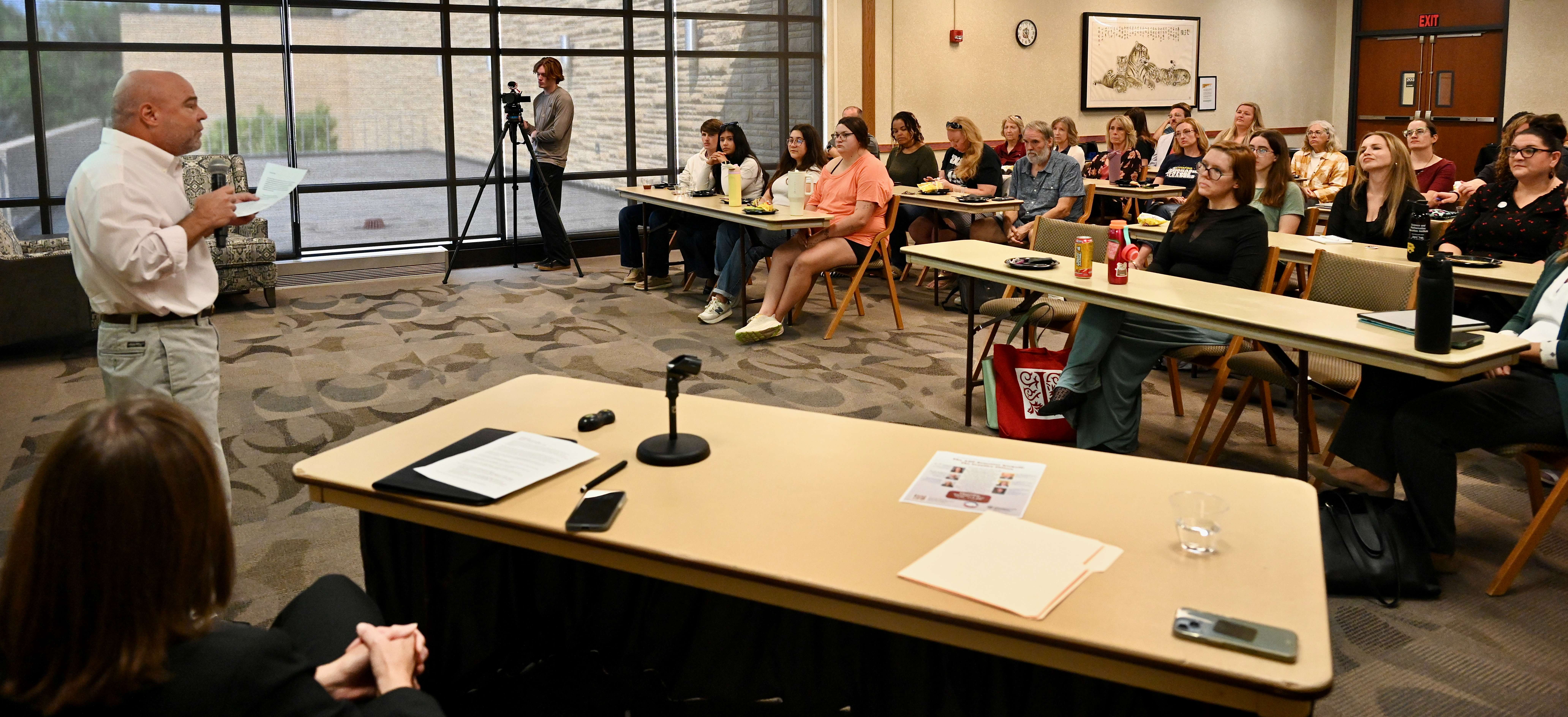
By RORY MOORE
FHSU University Relations
The American Democracy Project (ADP) at Fort Hays State University launched its new annual theme called ‘The Creative Citizen’ during a lecture inside Stouffer Lounge of Memorial Union on Thursday, Sept. 4.
The goal of the theme is to explore dynamic connections between academic work and civic engagement, discover how educators intersect their work with the latter, and comprehend how education can contribute to shaping engaged and creative citizens on campus and in their broader communities amid a chaotic political climate.
The theme launch was a collaborative effort across several academic offices in the College of Arts, Humanities, and Social Sciences. Featured speakers included: Dr. Jill Arensdorf, Provost/ Vice President of Academic Affairs & Professor of Leadership Programs; Dr. David Macey, Dean, College of Arts, Humanities, and Social Sciences & Professor of English and Modern Languages; Dr. Darrell Hamlin, co-director of ADP at FHSU & Associate Professor of Political Science; Dr. Lori Kniffin, Director of Civic Learning and Engagement & Voss Distinguished Professor of Leadership; and Dr. Amber N. Nickell, International Coordinator for the College of Arts, Humanities, and Social Sciences & Associate Professor of History.
Dr. Wendy Rohleder-Sook, chair of FHSU’s Department of Communication Studies, Law, and Political Science, moderated the discussion, as the speakers, who represented ADP, shared how they engage students to foster community interaction and leadership.
“Our mission at Fort Hays is to provide quality education to Kansas, the nation, and the world through an innovative community of teachers, scholars, and professionals,” Arensdorf said. “To develop engaged global citizen leaders has been the fabric of our institution since its beginning. We’ve always been about creating human beings who can be engaged in communities and beyond.”
The Academic Affairs Priorities for 2025-26 and beyond, as laid out by Arensdorf this fall, are focused on regional engagement, student success, academic innovation, and data-driven decision-making. The work of ADP certainly connects to many of these priorities.
“Our (FHSU’s) definition of student success is not only retaining and graduating students, but social responsibility as engaged global citizens,” she said. “We want our students to get good jobs, and to help them develop a skill set and the knowledge to be able to go out and be community members in whatever communities they find themselves in.” The ADP assists in this goal.
Arensdorf discussed a new program that the ADP will deploy through its Civic Passport.
“This passport is an example of program innovation that connects to many academic programs, and will help students, faculty, and staff develop the skills to be an engaged system,” she said.
Macey emphasized how challenging the ADP’s work has become due to the polarization of public discourse and increased partisanship in civic spaces.
“The American Democracy Project creates the condition of possibility for addressing these challenges and for transforming our world on the local, national, and global levels,” Macey said. “In that way, it directly supports and advances the mission of the College of Arts, Humanities and Social Sciences, which is to prepare students for successful professional lives, lifelong learning, and meaningful engagement in an increasingly unpredictable world.”
Hamlin delivered the final lecture, focusing on creativity as the project’s theme rather than the previous theme of listening.
“We don’t think about listening as a democratic skill the way we think about organizing or talking,” he said. “Listening is critical, but creativity is (also) a deeply undervalued part of the responsibility of the citizen. Democracy is skill-based, but it’s importantly practiced as an art.”
He stressed that democracy is necessary for sustaining human survival through individual expertise.
“It’s planning for success with technical and adaptive skills for innovation and response, but also for improvisation during inevitable moments of stress and breakdown,” Hamlin said. “Artistically, these skills will need to be used to thwart any kind of corruptive power structures that undermine the foundational democratic values of our world toward the greater good of survival.”
“We want students to understand that whatever instrument they play as individuals, they will also have to collaborate with and support others creatively.”
For more information, contact Dr. Hamlin at dahamlin@fhsu.edu or visit https://www.fhsu.edu/polisci/americandemocracy/.






